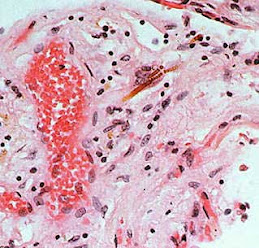Mesothelioma Dangers
By: Jessica KiharaUnderstanding Mesothelioma
Mesothelioma is the term used to describe the cancer that can affect the tissue that lines the lungs, heart, stomach and other organs. Although most people think that mesothelioma is a condition that only affects the lungs, it can in fact start in other organs or in the abdomen. One of the most common reasons why mesothelioma develops is the inhalation of asbestos particles. It can often take thirty years or even longer for the disease to develop after being exposed to asbestos.
Diagnosing Mesothelioma
Many times a person who has developed mesothelioma is not even aware of the condition. In fact, the diagnosis is commonly made after a patient visits the doctor because of symptoms that are not directly associated with the disease. If the lungs and chest are affected, a person commonly complains of a cough or shortness of breath. There can also be difficulties when swallowing, and often there is unexplained fatigue and weight loss. Muscle weakness is common, as is pain in the area to the side of the chest or the lower back. If mesothelioma first develops in the abdomen, symptoms could include nausea and vomiting, or pain in the abdomen. Weight loss is also common in spite of an unexplained abdominal swelling.
Testing for Mesothelioma
These symptoms are commonly caused by many different diseases, which can make it difficult to diagnose mesothelioma. However, if a person experiencing these symptoms also has a past history of asbestos exposure, then further testing should take place to either confirm or rule out mesothelioma. Blood tests and imaging tests such as a CT scan are commonly used, along with other procedures such as examining tissue samples from the affected area. Pulmonary function tests are also commonly performed when mesothelioma is diagnosed to see how well the lungs are functioning, and to determine if surgical procedures to remove portions of the lungs are an option.
Treatment Options
Mesothelioma is generally treated with chemotherapy, radiation therapy, surgery, or often with a combination of these treatments. The treatment chosen generally depends on the stage of the disease as well as the location. As a general rule, chemotherapy can be used to slow down the disease s progression, but it cannot actually eradicate the problem. It is often used in conjunction with surgery to improve the chances of success. Traditionally, radiation was difficult to use with this disease, due to the fact that radiation is generally more effective at treating individual tumors. However, there have been new techniques developed that may make radiation a more viable option. Radiation is sometimes used to treat specific areas of the cancer that weren t removed during surgical procedures, as well as to relieve some of the symptoms. It is also used in cases where a patient s health isn t good enough to allow for surgery.
Surgical options are sometimes used to try to cure the disease by removing the cancer. In other cases, especially when the cancer has spread too far, it is used only to help alleviate specific symptoms or pain which has been caused by the disease. The disease is difficult to treat and the survival statistics are not good, often because it is not discovered until it has reached an advanced stage, but there continue to be improvements in treatment methods.
Author Resource:-> Mesothelioma is a dangerous condition that needs to be identified and treated. Learn more about how to do so here: http://notnaturallyhealthy.com/about-mesothelioma-types-symptoms-and-treatment/
Article From Free Articles Directory | ArticleDirectoryCentral

No comments:
Post a Comment